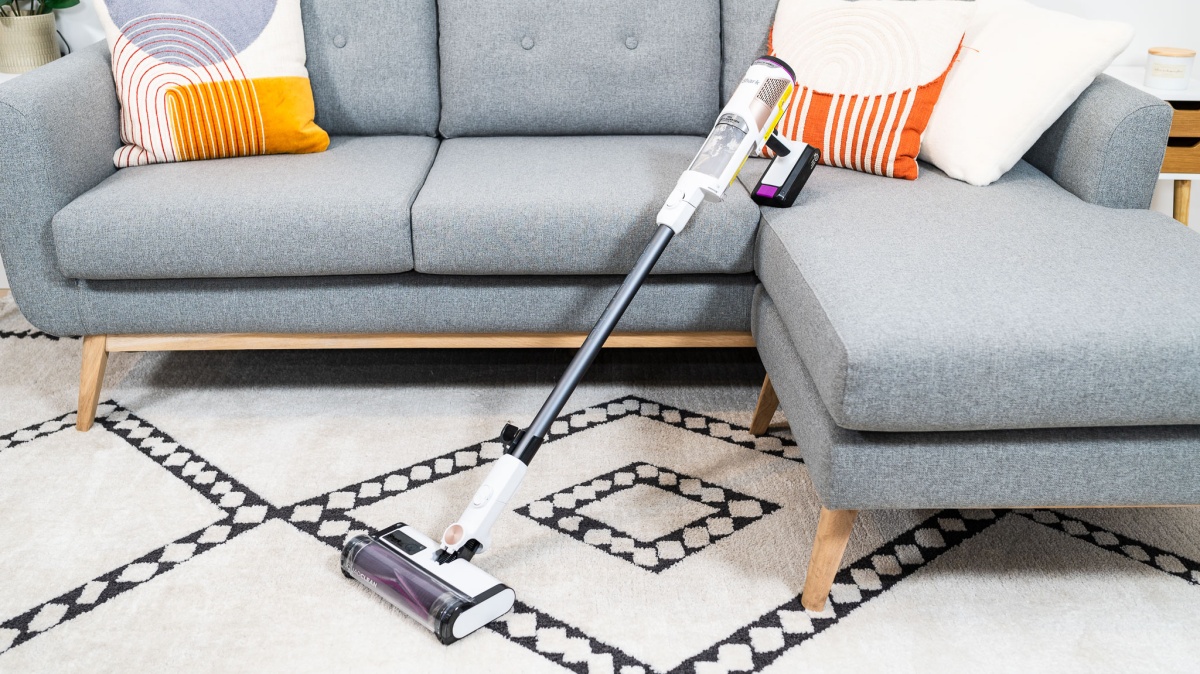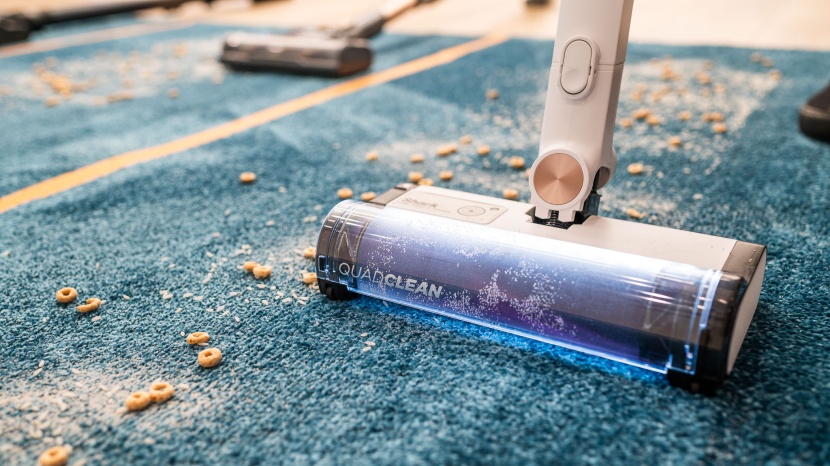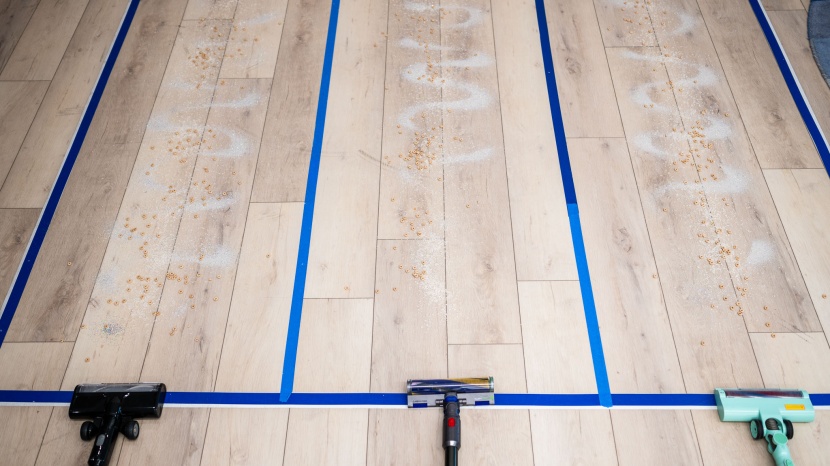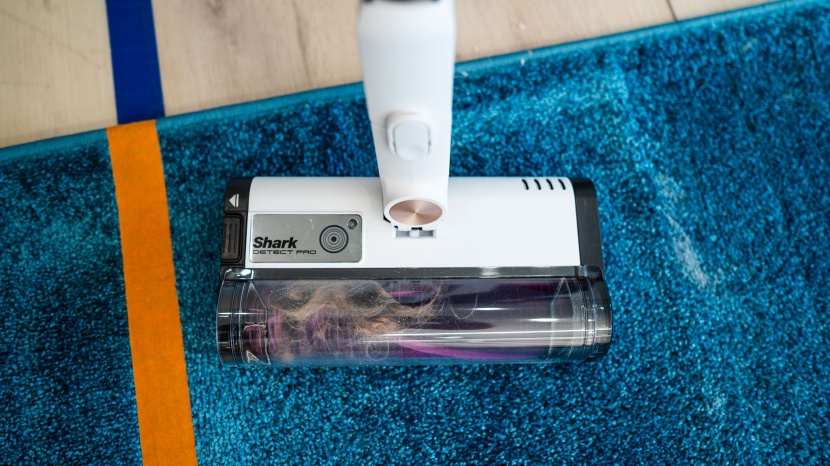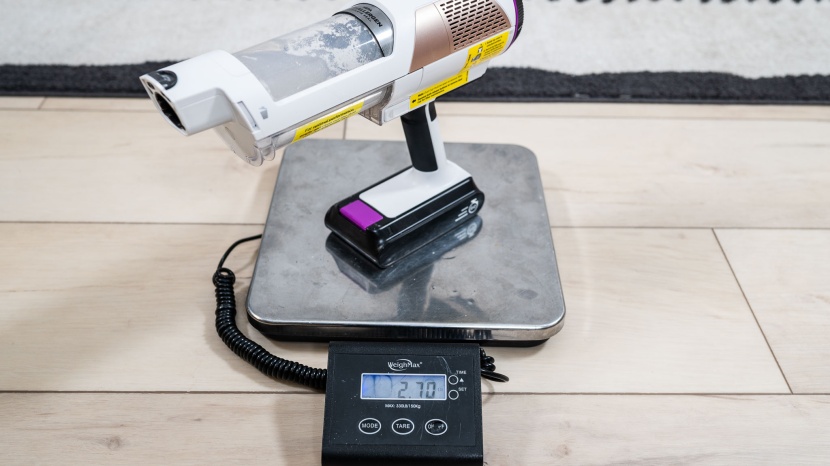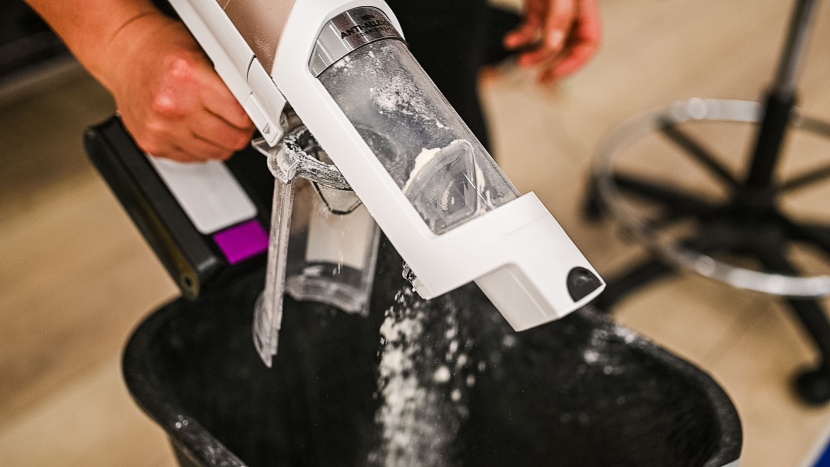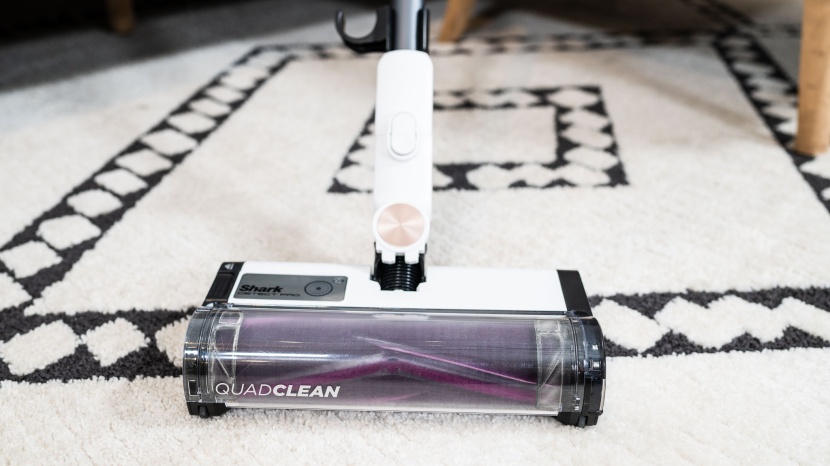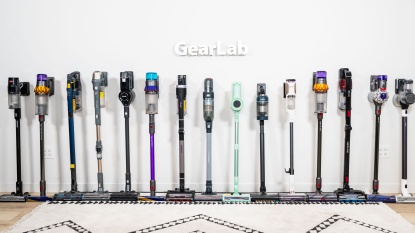Shark Detect Pro Review
Our Verdict
Compare to Similar Products
 This Product Shark Detect Pro | |||||
|---|---|---|---|---|---|
| Awards | Best Cordless Stick Vacuum for Most Households | Best Buy Cordless Vacuum | Best Stick Vacuum on a Tight Budget | ||
| Price | $380 List $229.00 at Amazon | $450 List $449.99 at Amazon | $300 List $299.99 at Amazon | $330 List $309.00 at Amazon | $200 List $149.99 at Amazon |
Overall Score  |
|||||
| Star Rating | |||||
| Bottom Line | This cordless vacuum's hybrid brush roll is designed for all floors, but it works much better on hard floors than carpet | This stick vacuum has all the cleaning performance most need in a lightweight package | A bit clunky in maneuverability and below average on hardwood, its powerful suction redeems itself on carpet | This stick vacuum is surprisingly effective while maintaining a low price | A vacuum that gets the job done without breaking the bank |
| Rating Categories | Shark Detect Pro | Shark Vertex Pro Li... | Tineco Pure ONE S11 | Shark Pet Plus | Levoit LVAC-200 |
| Carpet Performance (35%) | |||||
| Hardwood Performance (25%) | |||||
| Pet Hair (20%) | |||||
| Filtration and Suction (10%) | |||||
| Ease of Use (5%) | |||||
| Battery (5%) | |||||
| Specifications | Shark Detect Pro | Shark Vertex Pro Li... | Tineco Pure ONE S11 | Shark Pet Plus | Levoit LVAC-200 |
| Low Pile Cleaned | 75% | 90% | 90% | 92% | 86% |
| Hardwood Cleaned | 97% | 96% | 83% | 93% | 77% |
| High Pile Cleaned | 40% | 56% | 56% | 49% | 42% |
| Pet Hair Cleaned | 48% | 67% | 62% | 56% | 52% |
| Max Mode Runtime | 10 min | 12 min | 11 min | 14 min | 17 min |
| Low Mode Runtime | 40 min | 48 min | 29 min | 43 min | 35 min |
| Suction | 174 Pa | 323 Pa | 1294 Pa | 75 Pa | 274 Pa |
| Charge Time | 2.5 hrs | 3.2 hrs | 3.5 hrs | 2.8 hrs | 2.8 hrs |
| Noise Level | 79 dBA | 77 dBA | 80 dBA | 77 dBA | 80 dBA |
| Handheld Weight | 2.7 lbs | 3.8 lbs | 3.5 lbs | 3.6 lbs | 3.3 lbs |
| Crevice Cleaned | 19 % | 85 % | 83 % | 85 % | 94 % |
| Dustbin Capacity | 0.4 L | 1.0 L | 0.6 L | 0.3 L | .75 L |
| Storage | None | Foldable standalone | Wall mount | Wall mount | Standalone |
| Trigger | No | No | No | No | No |
| Variable Suction Control | Yes, automatic | Yes | Yes, automatic | Yes | No |
| Model Number | IW1111 | IZ662H | Pure ONE S11 | IZ361H | LSV-V201-WUS |
Our Analysis and Test Results
We couldn't help but notice Shark's “Detect Pro” name, which pits it directly against Dyson's V15 Detect and the company's well-known debris detection technology that adapts suction power based on floor type and the volume of debris underneath it. Both vacuums count particles and make adjustments as they suck, but there's a big difference in how we saw and detected debris on hardwood — read further to learn more about the differences.
Carpet Performance
To replicate a messy environment at home, we spread 1.5 cups of sand, rice, and Cheerios over a 27-square foot area of carpet, then limit each vacuum to 24 seconds to see how much material it's able to suck up. We ran our tests multiple times over both low pile and high pile carpet to ensure accurate results.
While most people will likely have more than 24 seconds to clean up messes at home, our time trials establish a rate that we believe is indicative of a quick clean-up around the house, allowing us to verify how efficient each machine is at picking up a set amount.
Low Pile
On low pile carpet, I noticed this vacuum was one of the worst offenders we tested for backward plowing, which slowed its performance because reverse strokes were far less effective than forward strokes. It only managed to suck up 75% of our test debris, which is below average for all vacuums we tested and is significantly less than the 90% collected by its sibling, the Shark Vertex Pro Lightweight.
| Shark Detect Pro Cordless | |
|---|---|
| Trial 1 | 77% |
| Trial 2 | 74% |
| Trial 3 (if needed) | ✖ |
This vacuum seems underpowered to me, especially compared to other heavier, larger Shark vacuums I have tested. More so than others, it visibly left sand behind near the end of the test, making me believe that it lost suction when the small dustbin filled up.
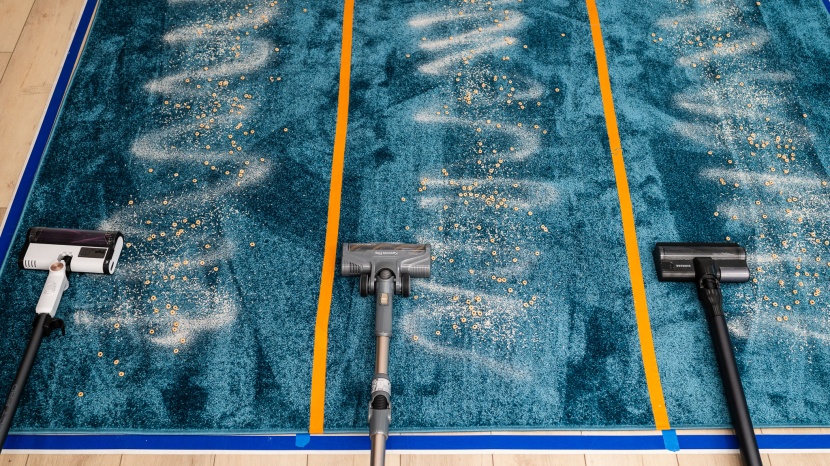
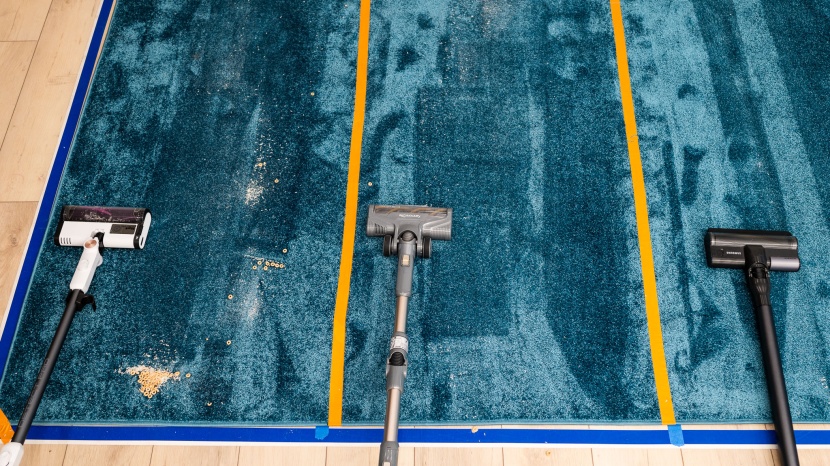
Those who have carpet in their home might want to start vacuuming with a clean dustbin and empty it frequently to get all the performance they can out of this machine on carpet.
High Pile
On high pile carpet, it struggled as well, falling below the average collected by other cordless vacuums we tested in the same way.
| Shark Detect Pro Cordless | |
|---|---|
| Trial 1 | 42% |
| Trial 2 | 29% |
| Trial 3 (if needed) | 37 % |
With an average pick up of just 39% of our test debris, we identified two possible explanations for this sub-average performance. First, when the relatively small 0.4-liter dustbin fills up, performance seems to degrade quickly. Second, Shark's Quad-Clean brushroll might have too much soft cushy material to adequately whisk debris from carpet and into its suction tube.
“On high pile carpet, I watched this vacuum just roll right over the top of sand and Cheerios,” Rachael said. “Kind of disappointing.”
Instead of a single combo brush roll, the Stratos has a Duo-Clean system with two separate rollers. The first roller is soft and fluffy, designed with hard surfaces in mind. The second is a conventional roller with PowerFins that helps agitate the carpet's fibers. Those with lots of carpet square footage in their house may want to err toward brush rollers with stiff, long bristles.
Overall Carpet Cleaning Performance
The Detect Pro underperformed in our rigorous carpet performance tests, delivering below-average results on both low pile and high pile carpets, contributing to its overall lower ratings.
If carpet cleaning prowess is critical to you, the Tineco Pure ONE S11 outperformed the Detect in all our carpet tests while costing slightly less.
Hardwood Performance
To test hardwood performance, we conduct a similar 24-second stress test with a pre-weighed 1.5-cup cocktail of mixed debris. After each trial, we weigh the material collected and record performance data and first-hand impressions to help articulate why we recommend some vacuums over others.
Surprisingly, the Detect Pro performed much better on hardwood than on carpet, giving me hope that this machine has a place in some homes. While this vacuum absolutely excelled in two hardwood tests, it took a step back in another. Let's take a closer look.
Cleaning Performance
While we suspect the soft fibers of the Quad-Clean brush roller were to blame for its poor carpet performance, those same fibers had no trouble whisking debris into the suction channel and tube. In fact, the whole experience was remarkably better, leaving us with floors that almost seemed polished.
| Shark Detect Pro Cordless | |
|---|---|
| Trial 1 | 95% |
| Trial 2 | 98% |
| Trial 3 (if needed) | ✖ |
This little vacuum crushed our 27-square-foot test on hardwood, sucking up 97% of sand, rice, and Cheerios in our 24-second timed trials, slightly better than the Vertex Pro and just under the performance levels of Dyson vacuums that cost twice as much.
I believe this vacuum could be a good option for someone with only hard floors in their house. With head-on passes, it was a cereal-gobbling monster!
While this option did a great job on hardwood, it didn't prove its performance like the V15 Detect or any other Dyson that includes the company's innovative Fluffy Optic cleaner head. This cleaner head features a low-angled green laser-like light that does an outstanding job of illuminating tiny hairs or dust particles on hard floors. The light and the shadows combine to let human eyes see what's there that isn't noticed under regular light — or even see in front of the typical LED headlights found on many competing vacuums.
Crevice
To test crevice effectiveness, we measure and weigh sand and then place it between the slats of a bamboo mat. Each vacuum gets a shot at sucking up as much sand as possible in four passes. This test is difficult because each vacuum can't rely on its brushroller to whisk the sand. To get all of the sand, the vacuum must have enough suction power to lift it away from the mat.
This model struggled to collect just 19% of the sand, which is far below average and at the bottom of our results. In comparison, the similarly priced Pure ONE S11 sucked up more than 4x as much sand, 83%.
What can we learn from this test? The dustbin certainly didn't overfill, so reduced performance due to a filled dustbin is unlikely. Because the brushrolls don't make contact with the sand in the crevice at all, brushroller design is unlikely a factor. When we measured suction power at the head, which we discuss in more detail below, the crevice problem seemed to be due to a lack of suction power.
This vacuum goes over the mat with little success. It was an odd sight to see that there wasn't even much progress in attempting to grab the sand between the slits. Usually, vacuums can at least grab little by little, but the poor suction power means users will need to be wary of grouted areas, large slits, and transition areas in their houses. Those who have crevices will likely need to break out a wand attachment tool to get results, which, let's face it, is annoying when we're talking about a vacuum with “Pro” in its name.
Edges
After a lackluster performance on crevice testing, we were excited to find that this model could pick up 100% of all coffee grounds in both our parallel and head-on testing. Long hallways, corners, and tight areas will all be a breeze with this machine.
One question some might consider is this: Why does the Detect Pro succeed with edges while failing with crevices? Coffee is lighter than sand, which helps, but the cleaner head is built well for edges. For head-on passes, the cleaner head's underside gets nearly flush with the wall, giving its suction and brush roller close access to the coffee. For parallel passes, we like that the suction channel in the bottom of the head extends very close to the sides, but this Shark also has a built-in side detection sensor that boosts suction when it senses a close wall.
Overall Hardwood Cleaning Performance
This machine posted above-average rating scores on flat-floor hardwood as well as along edges but struggled with our crevice test, posting one of the worst performances we've ever seen.
We believe those with high-traffic hallways will appreciate this edge performance and enjoy its flat-surface performance everywhere else. For those with many crevices, such as deep grout lines in tile floors, consider a more powerful vacuum like the Shark Stratos Cordless.
Pet Hair
Owners of dogs or cats that shed hair will likely want to shy away from this model. It really struggled to pick up pet hair without clumping. To test it, we weighed 4 grams of pet hair which, when held in a hand, looks like a big, overflowing handful of hair with strands poking out everywhere. To deposit the hair on the carpet, we don't just sprinkle it. No, we smear it on and then mash it into the fibers with a heavy roller. We then add 1 gram of hair extensions, which simulates the long hairs that are often shed by long-haired humans in your household. And we roll that in, too, to simulate typical household traffic.
Out of all the vacuums I tested that trapped clumps of pet hair in the brush roll, this vacuum was the worst offender. This result occurred on both low and high piles, leaving a huge clump of hair stuck in the brush roller on each test.
In many vacuums, pet hair can get caught in tines or stiff bristles, but the bottom of this cleaner head has no tines, and the brush roller has few stiff bristles. This tells us that this new multi-purpose roller type still can't prevent clumps or stop long hair from wrapping. Those who are Shark fans and need a vacuum for pet hair might want to consider the Stratos Cordless instead, which sucked up nearly 30% more hair.
Filtration & Suction
We test both filtration and suction to help consumers find the balance of performance they need in their own households. Sometimes, higher-powered vacuums have poor filtration due to the increased airflow. While we usually like more power, those who have extreme sensitivities to allergens, pet dander, or dust may need vacuum cleaners that help maintain air quality in their homes.
This model prioritizes filtration capabilities over raw suction power, ranking well above average in filtration but well below average in measured suction power.
Filtration
Our closed-room flour test is a challenge for many vacuums. We start by creating a clean room in our lab by running air filters overnight. We then spread 1/3 cup of flour on the flour, which is made up of very fine particles and mimics harmful airborne particulates that could penetrate deeply into your lungs, potentially causing health issues. When we vacuum up the flour, we monitor the air using two Dylos air quality monitors that can count particles floating in the air.
| Shark Detect Pro Cordless | |
|---|---|
| Small (2.4-0.5) | 63 |
| Large (>2.5) | 39 |
This vacuum generated no strong spike in particulate matter, earning it an excellent score and making it a good choice for those sensitive to allergens or pet dander. Most vacuums we tested released or stirred up under 300 particles in our test, which is a good result that is unlikely to cause significant air quality changes for most people in most households. Some, like the Kenmore Elite CSV Max DS4095, spewed much more — 1,542 particles, giving it a poor ranking in our tests.
Suction
The lab-measured suction power of the Detect Pro is very low and likely contributes to its underwhelming performance in our carpet tests.
We measure suction power at the cleaner head, not the intake tube to the dust bin. Our suction test reveals real-world differences in how different cleaner head designs can affect suction where it matters most — at the cleaner head when you're using the vacuum. The suction measured in at 174 pascals, which is significantly lower than most other brands; however, it's possible that Shark underpowered this unit on purpose in order to save weight and make the vacuum easier to use. Unless a very lightweight vacuum is critical, 174 pascals is surprisingly non-competitive for a cordless vacuum with a $380 MSRP.
Ease of Use
This vacuum stands out for its ultralight motorhead weight of just 2.8 lbs, giving it a super light feel in my hands.
This slim vacuum is exceptionally user-friendly, particularly for individuals who prefer a lightweight option. It's an excellent choice for older adults with hard floors or minimal vacuuming requirements.
Maneuverability
This model was very easy to push and pull, making it one of the most friendly vacuums I have ever tested. If you're tired of pushing around a bulky vacuum, this is your answer. The cleaner head did catch while transitioning from hard floors to mats and rugs, but because the vacuum is so light, it's easy to tilt and correct. One drawback that surprised me was that it didn't corner very tightly because sharp turns tended to lift the brush roll head.
Maintenance
This version has a clamshell dust bin opening that seems like it would be easy to use — but I was frustrated when I had to empty it.
The dustbin makes a huge mess every single time I emptied it over a trash can. It opens awkwardly. So annoying.
To make matters worse, the interior of the dustbin has several ridges and pockets for strength or airflow dynamics. These interior elements catch dirt and force you to rotate and tilt the dustbin to empty it, making it even harder than it should be to empty it cleanly and quickly.
Removing the filter from the dustbin proved a bit challenging at first, but once I managed, rinsing the two filters and setting them out to dry was straightforward. On the other hand, I appreciated how easy it was to remove the brush roller—it simply required the push of a button.
In comparison, the DuoClean heads on the Shark Stratos and Vertex have two rollers, but you can only remove the soft roller. Non-removable rollers are harder to clean, particularly when they collect a lot of wrapped hair on them.
Uphostery & Attachments
This unit only comes with one attachment — a crevice tool, which was also easy to use, though it wasn't particularly effective on fabric or furniture in our tests. Typically, we would prefer to use a small motorized roller accessory for this test, but this crevice attachment is all that ships with this “pro” vacuum. One key reason we like cordless vacuums so much is that they're versatile. Without much to work with, this vacuum lacks versatility compared to the best vacuums we tested, like the Dyson V15 Detect, which comes with a stellar motorized roller tool that's even good with pet hair.
Battery
The battery lasted just over 40 minutes on the lowest setting and just over 10 minutes on the highest. Because this machine is a bit underpowered, we expected a better-than-average battery life when running a less-powerful motor.
Those with primarily small jobs around the kitchen will likely have enough runtime to tidy up — but they might need a recharge for whole-house, multi-floor days.
Should You Buy the Shark Detect Pro?
As our extensive testing revealed, the Shark Detect Pro is a lightweight option that excels on hardwood, making it a great choice for those who primarily have hardwood floors and simple, low-pile carpet needs. Because it's so lightweight, we believe it would be a good option for aging adults or kids who are learning to help out with chores at home. It's not a great choice for high-activity homes with a lot of carpet and certainly not good for pet hair challenges. We're also not bullish on it at its full MRSP, but it could be a winner for your hard floor needs if it's on sale.
What Other Stick Vacuums Should You Consider?
If you can afford a jump up in cost, the Shark Stratos Cordless is a midrange-priced powerhouse that does everything well. At $150 less than the Detect Pro, the Levoit LVAC 200 was slightly heavier and harder to maneuver, but it outperformed the Shark on all surfaces in our tests, earning it our Best Buy award.


